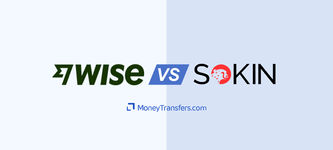What are Cross Border Business Payments?
Companies that do business with global partners need a reliable and low-cost way of sending and receiving money abroad. In this guide, we will share the top money transfer options for you to get started. They include widely recognized options like Currencies Direct and Wise.
Challenges of cross border payments
Cross border payments occur when one business sends money to another one, and the transfer involves two different countries.
In most cases, international business transfers involve currency exchange.
Historically, businesses have had to battle some key challenges in relation to cross border payments through banks. These are high costs, low speed, limited access and lack of transparency of the process.
For businesses, money transfer companies offer greater access to global markets.
The benefit of this access is almost opposite to services offered by banks. Costs are lower in both fees and exchange rates, transfers can be completed quickly, many offer global currency access and an entire breakdown of process is given in advance to sending.
Many money transfer companies now also offer local accounts in the form of multi-currency business accounts. This gives even more access to markets and means cross border payment demand could actually be slightly lower.
Here's how each option for cross border payments compares:
Cross border payment methods | ✅ Best for | ❌ Not great for | 👉 Offered by |
|---|---|---|---|
Sending money with a money transfer company | Most outgoing transfers, risk management services (like forward contracts) | One off small transfers | Wise Business, Moneycorp, Regency FX, TorFX |
Banks | Local payments in the same currency | Cross border payments in different currency | Your regular bank |
Cross border transaction fees
International money transfers incur fees in most cases, which adds to the cost of doing business.
Banks tend to be the most expensive since they charge around $20 to $50 per wire transfer.
You can save money on fees by choosing a competitive money transfer company. For instance, options like Wise offer fees from 0.35% and TorFX provide free international transfers that businesses can take advantage of.
Average fees for cross border payments
Company type | Average fee |
|---|---|
Money transfer company | ✅ from $0 up to 1% |
Banks | ❌ from $5, usually up to $50 |
Here's how each of the options work in a little more detail - and a difference in the cost:
.png)
Cross border payments in action
Cross border transactions work in a couple of different ways.
Bank transfers
Bank transfers can work in a couple of different ways. The route to the payment being complete will depend on whether a bank has a direct relationship with another bank.
Where the middle step of the correspondent bank is not needed, this step would be removed.

Many banks are part of an international network that allows for reliable and safe transactions. The different bank transfer types include SWIFT transfers, wire transfers, and ACH.
However, the transfer speed of bank transfers can take a few days up to a week. This can result in cash flow problems for businesses.
Money transfer companies
To simplify cross-border payments, consider selecting a money transfer company. Business-orientated companies like OFX and Currencies Direct are solid options that you can use to take advantage of forward contracts and spot contracts.
Whilst the process is similar, the detail of it differs. It is by using its OWN network of banks, that a company can provide cross border transactions.

If you are using a multi-currency business account, this also includes the potential to send direct from your account.
A bank transfer as a payment method
Money transfer companies will list a bank transfer as a payment method. This is how you will 'load' an account. This is NOT the same as sending money directly using your bank.
For comparison, you can also load accounts using debit cards, cash drop-off (in some instances) or credit cards.
Bank transfers through money transfer companies are the most cost effective option.
Card payments
Card payments are popular for cross border transactions in more obvious areas like eCommerce or subscription collection. Whilst these are offered by a lot of companies, it can feel expensive. For example, Airwallex charges around 3.5% for an international transaction.
Processing time is instant in many cases, and robust security measures are used by credit card companies.
eWallet
It is possible send money using eWallet accounts, which are generally free and instant. However, the most competitive eWallet transaction requires that the recipient also has an account with the same service. Some of the most commonly used eWallets are Cash App, Android Pay, Samsung Pay, Google Wallet, PayPal, and Venmo.
Types of cross-border payments
Cross-border payments can be broken down into several types. Understanding these helps provide a framework for differentiating various types of business payments. The methods, fees, restrictions, and considerations will differ from optimizing them.
B2B Payments
B2B payment refers to the transferring of funds from one business to another - business to business. This could be when an office pays a cleaning company, or a construction company pays for building materials.
B2C Payments
C2C Payments
C2B Payments
Cross border payments risk
Risk in cross border payments can be identified in a couple of different ways.
Regulation and safety
Firstly, you need to ensure that a safe and verified platform is used to process the transaction. For example, using platforms that are regulated, have 2FA and in the case of business transactions in particular, carry out regular audits of accounts with fraud teams.
The money transfer services we recommended have all been verified by trusted 3rd party organizations like FinCEN and FDIC.
Currency risk
The second element of risk, is currency exchange risk.
Working strategically on currency exchange risk will offer huge benefits. For example, forward contracts allow businesses to lock in exchange rates for an extended period of time.
Explore currency risk

Currency exchange risk is a wide-ranging subject and correct management can have a huge impact on a business.
Explore risk management in more detail, and ensure your business is setup to suceced.

Best 5 international money transfer providers for cross-border payments
We understand that you might be overwhelmed by the number of money transfer services for cross-border payments. Therefore, we have done the research to narrow down the options to the top 5 companies you can use today.
TorFX offers excellent business functionality like spot contracts and mass payments. This offers businesses the flexibility they need to save money on FX rates and automate the process of sending money to a large number of people. Also, they have a straightforward user interface that is easy to grasp for beginners.
TorFX does not charge a transaction fee, but instead, you will pay a currency exchange markup of 1-2%. The percentage depends on the currency pair and the amount you are sending. Finally, TorFX offers strong customer support, which is excellent for businesses that need help figuring out how to use the platform for setting up cross-border payments.
Pros
Cons
Wise is a trusted and transparent platform that allows for fast transfers, matches the mid-market rate, and offers free balance transfers. The transparency of Wise will enable you to compare the fees and FX rates before initiating the transaction. This is great for comparing the quality of the deal with other money transfer services.
Wise has an easy-to-use platform that provides plenty of useful hints in its user interface. Also, their customer support goes the extra mile to offer help. The company is also regulated by the Financial Conduct Authority for your peace of mind.
Pros
Cons
OFX is a business-friendly platform that comes with advanced features. For example, you can lock in an FX rate for 24 hours, allowing businesses to manage FX rate costs. Also, recurring transfers and forward contracts are offered to improve further the ease of doing business internationally.
The specialists at OFX provide current market news on FX rates, which helps international businesses to get accurate data. Also, they have a 24/7 customer service department that includes phone and email.
Pros
Cons
Currencies Direct is another business-orientated specialist transfer provider that offers strategic advantages. The customized and flexible payment options enable businesses to set up forward contracts and utilise a multi-currency card.
Customers can open up an account with up to 60 currencies, which is perfect for minimizing the cost of cross-border payments. Also, there are no transfer fees for international transfers, which means you will save significant sums of money compared to bank transfers.
Pros
Cons
Airwallex is an excellent money transfer service for business customers. They offer competitive FX rate mark-up percentages of 0.3-0.6%, which means you will be saving money compared to banks. Also, they utilize local payment technologies to reduce or eliminate cross-border payments.
The company provides accounting software integration and a multi-currency account with 14 currencies. Also, customers can create borderless virtual cards to safely pay for goods worldwide.
Pros
Cons
How to make cross-border payments
The timeline of signing up to a company for cross border payments will be dependent on the type of company you are. For example, an enterprise level business might need to provide accounts for a set period of time, whereas an eBay or Etsy seller may just need to confirm registration details.
Choose a transfer provider that matches your business needs
The need for a cross border payment provider will change based on your business. A provider like Xe Business, which offers mainly risk management and transfers, is suitable for business - but perhaps not freelancers. However, companies like Airwallex or Payoneer offer end-to-end suites that include integrations, multi-currency cards and local account details.
Register with the company and provide verification details.
Registration needs will change per business but generally there will be:
ID checks of point of contact and business ownership
Registration details for the business in question
Bank details could be needed in cases where a multi-currency account is not being set-up
Any supporting business documents like accounts or tax returns
Verification process starts, and may take a little time.
Depending on the complexity of a business, and the level of account being sought, verification times can change.
The main thing that impacts verification timeframes is any additional checks on accounts or supporting documents which need to be provided.
For the most part, verification should be done within a few days at most. Of course, there are exceptions to this both ways.
Begin the transfer process by entering the recipient details and the amount you wish to send.
Essentially, once verified, cross border payments can commence.
Most companies will provide a login or dashboard, or if you are using a managed service, it is possible to carry out the process with an account manager.
Be sure to pick the right type of company when signing up.
For businesses in need of currency risk solutions, we would always recommend using a managed service provider.
For businesses in need of access to multi-currency accounts and making regular payments, at a lower rate, it is likely an online only option will suffice.
How to receive international payments
The process of receiving international payments depends on the money transfer service you have chosen. Some only permit bank transfers, while others allow for balance transfers. We suggest that you have a look at the available options before registering for an account.
Wise is an example of a money transfer company that provides multiple ways of receiving money. They provide bank details to accept multiple currencies in their banking network. This reduces the transfer time and fees associated with international transfers.
Cross-border payments regulation
Businesses need to understand the regulations of the countries where they are sending cross-border payments. This relates to the taxes that must be paid, the paperwork that must be filed, and the organizations that might audit their books.
PSD2 regulations mean that businesses need to provide adequate customer authentication tools to safeguard user accounts. Handing transactions without these security protocols could result in fines.
EU cross-border payment regulations ensure that the cost of sending money abroad must not be lower with a foreign currency than if the national currency was used. This legislation seeks to ensure that the national currency within a country can remain competitive when it comes to cost.
Challenges money transfer companies solve
Cross border payments are best carried out working with a specialist money transfer company.
Businesses have to overcome multiple challenges when sending and receiving money internationally.
Money transfer companies are built to solve these problems.
Speed of transfers
Businesses need good cash flow to ensure that their operations continue to run smoothly.
Slow money transfers can result in delays. For instance, when sending suppliers a payment, they may only send the shipment when the funds have arrived.
International payments through banks can take up to 7 days, with money transfer companies, most are complete within 24 hours.
Cost of sending business payments
Market and currency access
Increased transparency
Help & FAQ
Get answers to the most common questions asked when sending money abroad. Covers costs, fees and the best way to compare.
Sources and further reading
Related Content
Contributors











